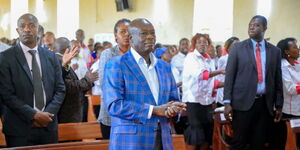Former Chief Justice David Maraga and EACC CEO Twalib Mbarak revealed a new trick being used by corruption suspects to evade arrest.
According to the duo who were speaking during an anti-corruption forum on Tuesday, May 11, many suspects were increasingly seeking conservatory orders before their arrest.
It was also revealed that the conservatory orders were also being sought in courts that are not of the Division of the Anti-Corruption and Economic Crimes.
Additionally, the duo noted that many of the bigwigs were going to courts which are preferred by the suspects and are in far areas.
Therefore, once the conservatory orders are issued, EACC cannot effect an arrest.
On his part, Mbarak likened the new trend to a situation where a student pursuing secondary education in Kilifi County registers for the final exam in Lodwar.
"There is an urgent need for the Judiciary and other actors in the justice chain to work out mechanisms for arresting what I am told EACC considers an emerging culture of judicial forum shopping by corruption suspects to delay justice in the enforcement of anti-corruption laws.
I’m told there are examples where suspects likely to be charged with corruption offences before the Anti-Corruption Court in Nairobi have abandoned Nairobi High Court Division on Anti-Corruption and Economic Crimes and travelled far and wide to preferred High Court Stations upcountry in pursuit of conservatory orders," Maraga added
Further, as a solution to the growing trend, Maraga urged the EACC to liaise with the Judiciary to formulate policies aimed at preventing the suspects from misusing the courts.
"EACC should engage the Chief Justice for a possible review of the applicable Practice Directions towards ensuring that all Applications relating to corruption charges are henceforth filed at the High Court Division on Anti-Corruption and Economic Crimes, which was established for that purpose.
"This is not only essential to clear the impression of a judicial forum shopping but also for the development of consistent jurisprudence on the subject," Maraga added.
In recent months, EACC has been going after former governors and company bosses for their alleged involvement in graft.
Some of the notable leaders who have been arrested or are under investigation include former Muranga Governor Mwangi wa Iria and his Kakamega counterpart Wycliffe Oparanya.
Former Treasury CS Ukur Yatani is also facing investigations over the loss of funds in Marsabit County where he served between 2013 to 2017.












